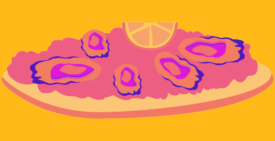The moment I saw her, I disliked her.
Impossibly young, practically a teenager, wonderfully pretty, this young woman with eyes full of a hope that I had once recognized in my own eyes, but now seemed impossible to imagine ever seeing or experiencing again. It was a typical fall Santa Fe evening; light was falling over the backyard in sheets of yellow, and my friend Cat sat smoking a cigarette near her fireplace, blowing plumes of smoke into the chimney.
I sat on the couch with my son, who at two years old was blind, immobile, plagued by seizures and the buildup of fluid in his lungs – he had one year left to live with Tay-Sachs disease.
He looked like a beautiful angel; he didn’t yet look sick and emaciated as he would in a matter of months, so when we interacted with people in the world, they were often bewildered, and sometimes a bit too curious. “Why won’t your baby look at me?” “How old is he?” Ronan still had – and would always have until his final days – the round plump face of a baby that has not yet developed facial muscles by learning to speak, and he never would. He made sounds, but this was not enough to tone the muscles in his face. He was – in every brutalizing way – forever a newborn.
This young woman had a fruit-related name, Cherry or Apple, I can’t remember now, and dark red hair that was shiny and straight and hung to her waist. I was bitter and sad, miserable and lonely, and the lightness and ease of her presence made me poised to strike. She wore a pouch of some kind around her neck, and smelled of patchouli and dust.
I resented her; I envied her, and then of course, I felt guilty. Still, anticipating the desire (although I would have called it a need) to shout, heat rose in my face. One word out of her mouth about how my kid looks, I thought, and I will let her have it. Cat, noticing my strained expression, tipped her head at me as if to say, she’s okay, give her a chance.
“May I sit?” she asked me. I nodded without expression, and pulled Ronan, who was positioned in his car seat – his small, mobile throne – closer to my side.
She looked at me and smiled. I softened not an inch. She looked at Ronan for a few long moments, but it wasn’t a look that attempted to categorize all that was wrong with him in the midst of his extraordinary beauty. Even while giving her some strong side-eye, I knew she was looking at him in a way that wasn’t judgmental or pitying or prurient. She was simply taking in his face, his sticky star fingers, his long eyelashes, as I did every day. She saw him, wanted to see him, was seeing him for all that he was in this moment and all that he would never be in all the moments the disease would steal from him. I felt a sob spreading in my throat, and although I sensed she was different than some people I encountered, out of habit, I still braced myself for what she might say and wished, as I often did, that I could throw an invisibility cloak over me, over Ronan, over the world.
She folded her pale hands in her lap and looked at me with a soft, neutral expression. I screwed my face up into a smile that probably resembled a grimace.
“I know there is something going on with your beautiful baby, and I don’t know what it is. If you feel like sharing,” she continued, “I’d love to hear everything about him. He has a wonderful spirit, that’s for sure.”
Although this may be a visual memory that time has fitted like a lens over this moment in the intervening years, as soon as she spoke, the sun dipped behind a cloud on its slow slide into the horizon, the living room in the adobe house was covered in cool but vibrant shadows, the dusk of the Southwest, and I burst into tears.
I realized how long it had been since someone had truly noticed my son, and know about him beyond just a knee jerk reaction or a curious stare.
I realized how long it had been since someone had truly noticed my son, and know about him beyond just a knee jerk reaction or a curious stare. What mother doesn’t want to tell someone every detail of their child’s life and habits and likes and dislikes? Her grace gave me permission. I gushed and gushed about him; his diagnosis, his sweetness, how much I loved him, and she nodded and smiled and then asked to hold him, which she did for a long hour, staring down at him with all the wonder and delight and sadness and sweetness of any mother looking at her sick child, memorizing his face, knowing that all images fade eventually, or shift and change in the light of reflection and the strange workings of memory that unevenly stitch time and history into a weird mental quilt we hide under at night when we can’t sleep.
The care and kindness of this stranger unlocked a heaving sadness that I knew I was carrying but was terrified to let loose, worried I’d be sucked up into the howl of grief and never return. I had been once to a gong bath in Santa Fe (which was not hard to find), and loved the feeling of the bell loosening sound and vibrations into the still bodies lying prone on yoga mats. A bell went off in my, and I made some racket as a result. I blubbered and sobbed and told her everything, and she kept looking at my face, all the while gently stroking Ronan’s soft hand with her long fingers until he closed his eyes and fell asleep.
She offered the important reminder that in a story that will have no happy resolution, for a disease that has no treatment and no cure, an extension of true compassion (even in the face of a reluctant and shattered recipient), is an act of grace like no other.
Years later, this young woman had a child of her own, and although I never saw her again, and likely never will, I like to imagine her with her child, and I am grateful to her. She offered kindness – which always trips the wire on emotions that want to be released, although I had not known or experienced its power to crack the heart open. She offered the important reminder that in a story that will have no happy resolution, for a disease that has no treatment and no cure, an extension of true compassion (even in the face of a reluctant and shattered recipient), is an act of grace like no other. It filled the room, it shored me up, it cracked my grief like an axe through a log and let some of it slip and slide and slither out and away, up the chimney with the plumes of cigarette smoke and into the sky.
When she stood to leave, I stood too. I don’t think I’ve hugged a stranger so hard or so long in my life, and I left her shoulder full of snot and tears. She kissed Ronan on the cheek, squeezed my hand, and left the house with whomever she had come with. I sat on the couch and cried for hours, and this time it felt good, it felt right, it felt – truly – like release, not the angry heaves that so open accompany grief and provide no comfort at all.
For the next year until my son’s death, when I met people who weren’t like the woman with the long red hair, people who lacked her gentleness and kind curiosity, which was all people, I remembered her, and chose my responses differently than I had previously. I held the image of her face in my mind, a face I had been so ready to dislike, and I did not bark or shout at anyone.
This, too, was a great gift, because empathy, unlike pity, spreads only when it is shared, like a still, clear pool that can comfort anyone who encounters it, like a perfect slant of sunlight across a yard or a face, like a sunset so beautiful it seems unreal, and like a boy whose few years on earth were not enough, and also everything.
Emily Rapp Black is Associate Professor of Creative Writing at the University of California-Riverside. She is the author of several books, including Sanctuary (Random House, 2021) and the forthcoming Frida Kahlo and My Left Leg (Nottinghill Editions/New York Review of Books, 2021).








